Tea, Blood Sugar Levels and Your Health

Key Takeaways
Want to start your day with a strong cup of English Breakfast and end it with soothing chamomile? If you’re the sort of person who reaches for a cup of tea when you’re looking for your caffeine kick, you’re not alone. One of the most widely drunk beverages, tea is also one of the oldest prepared drinks in history. While several stories surround its origin, one of the most popular ones places the discovery of tea in China, as far back as 2737 BC.
Now, tea consumption is as ubiquitous as water in many parts of the world. Black, green, white, oolong—you know there’s a variety of tea, but there’s so much more to the popular beverage. For example, do you know that tea comes from the Camellia sinensis, also known as the tea plant or tea shrub? It teems over with white blossoms in the autumn, but when it comes to the aromatic drink we know and love, it’s the leaves that you want to focus on.
Why are we going on and on about tea? Well, it has a stimulating effect on us, thanks to its caffeine content. And as you already know, caffeine can affect things like your blood sugar levels, so there’s likely to be a link with tea as well. Are you curious to see what effect the different types of tea have on your health and whether there’s a connection with high blood sugar, prediabetes, or diabetes? Read on to find out!
A Note About the Caffeine, or Theine, in Tea
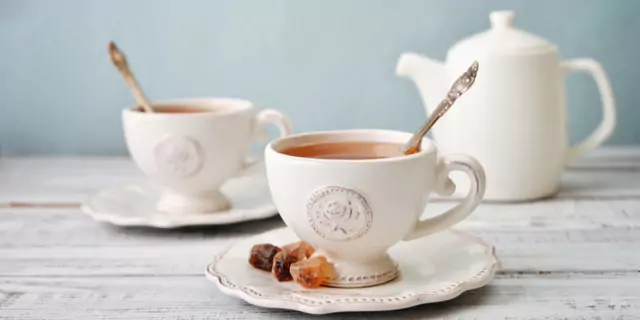
If you haven’t already, you can read more about caffeine and blood glucose in our article about coffee. Let’s spend a minute on it before we dive into the different types of tea. Some studies suggest that long-term consumption of caffeine can improve glucose responses over time. Studies show that caffeine may also improve your mood when you’re sleep-deprived, which may not surprise you if you depend on caffeine to kickstart your day!
But, what’s theine? Caffeine is often called theine when it’s in tea. And there’s some confusion about whether it’s the same or two different things. There are many nuances, but it is, in fact, more or less the same molecule. They were discovered at different times and so give different names. Something to note is that coffee has more caffeine content than tea, and the tannins in tea also help slow down the absorption of theine in your blood. Of course, this varies according to serving size, how sensitive you are to caffeine, and the type of tea or coffee you pick. Tea also contains polyphenols and theanine, an amino acid that can reduce stress.
Of course, we also know that everyone responds differently when eating different foods, and drinking tea is no different. So, the effects on your system may differ from someone else’s. Although theine releases slower, some people may be more sensitive to tea and some to coffee. There’s still so much ongoing research that you can’t say for sure how one will react over the other. An excellent way to see your reaction to tea may be by using a continuous glucose monitor (CGM) to track and monitor your body’s individual response to it.
Is Tea Good for Diabetes?

Various health benefits come up when you talk about tea. This is thanks in part to its antioxidant and amino acid content as well as its perceived ability to assist with anxiety, boost immunity, help with hydration, and reduce inflammation. Studies also show links between tea and diabetes management, with some focusing on the anti-diabetic effects of tea. Although there’s no one-size-fits-all for diabetes management (and research is still ongoing), some studies show that tea may help with blood sugar control. And there are some links between consuming tea and a lower risk of type 2 diabetes too. Of course, various factors come into play here. The type of tea you drink and what you add into it (like sugar, honey, milk, and so on) can also make a difference. Again, the best way to figure out how your body responds to tea is to experiment with it yourself. Consider working with a registered dietitian who may be able to help you figure out what your responses to tea are and how to optimize your health accordingly.
Tea and Glycemic Indexes
Because there are so many different types of tea, it’s not easy to talk about glycemic indexes in relation to it. For example, when you drink black tea, you can assume its glycemic index is zero. This is because there are no significant sources of carbohydrates or other sources of energy in it. But not everyone is drinking black tea. The fats, proteins, and lactose from milk (which can be broken down to glucose and galactose) have a slightly higher index. The real issue can be the added sugar, quickly absorbed into your blood when it’s dissolved in liquid.
Since people add different amounts of milk and sugar to their tea, a single glycemic index value is impossible. Still, it’s safe to say that options like bubble tea and sweet tea can have glycemic index values upwards of 50 thanks to the added sugars and tapioca pearls. When it comes to what’s best for you, it’s better to find out how the tea you drink responds to your body instead of looking at just facts and figures here.
The Types of Tea and Their Health Benefits

The interesting thing about tea is that there are so many different types. There’s the more common black tea and green tea, and then there’s everything from white and oolong to rooibos and hibiscus. Certain types of tea have anti-inflammatory properties, may lower blood sugar, or help with insulin sensitivity. But first, you need to know that there are two main types of tea: true teas and herbal teas.
True teas come from the evergreen tea plant, while herbal teas (also called tisanes) can be caffeine-free and are made with spices, flowers, and herbs. Sometimes these herbal teas are made with true tea infusions, which is how you get caffeinated versions like peach oolong tea, for example. While we can’t go through every single type of tea there is, here’s what you need to know about a few of the most beneficial types:
Green Tea
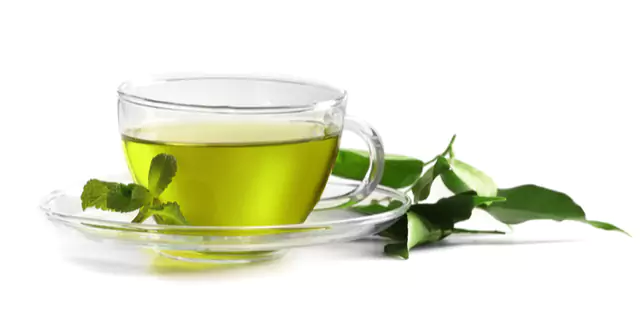
When you’re talking about health benefits, one of the most popular types of tea is green tea. Harvested tea leaves are quickly heated and then just as quickly dried, which means they’re less oxidized than black tea. Because of this, it has a milder flavor than black tea. The trade-off is that green tea has a slightly shorter shelf life. But it’s also naturally less bitter and has a smoother taste overall. So, it may be easier to drink it without milk and sugar, making it slightly easier to make this a ‘healthier’ option.
The Research: So, what are the effects of green tea on your health? Can a cup of green tea a day keep the doctor away? With a high amount of antioxidants, it could help with everything from preventing diabetes to aiding weight loss, as some studies suggest! Some people also see lower blood glucose levels and better blood sugar control because of a compound in green tea called epigallocatechin gallate (EGCG).
This sounds complicated, but what you need to know is that it’s a type of catechin that may play a role in reducing your risk factors for things like type 2 diabetes and obesity. The link with obesity may explain why people with weight loss goals often look to this drink for a bit of help. Research also found some beneficial effects on oxidative stress. Green tea may also have some impact on reducing fasting blood sugar levels among people with and without diabetes.
Black Tea

A strong cup of black tea is a pretty good way to start the day for tea lovers. Often thought of as the ‘original’ type of tea, this is a true tea made from the leaves of the tea shrub. The leaves are air-blown, cut, and then oxidized till they’re brownish-black. Black tea has a more robust flavor than some other teas and a longer shelf life as well. With some of the highest theine levels, it may also have significant responses to short-term and long-term blood glucose levels.
The Research: Green tea may get all the attention, but black tea has its fair share of benefits. It has more caffeine than most other types of tea, and there’s some evidence that the other molecules in tea can help control blood sugar levels. It also has some anti-inflammatory and antioxidant properties. Drinking black tea may help with some diabetes prevention, including type 2 diabetes. And a study even found that consuming black tea may affect your postprandial blood glucose levels. While the results are inconsistent here, there are also links between tea consumption and reduced risk factors for cancer.
Oolong Tea
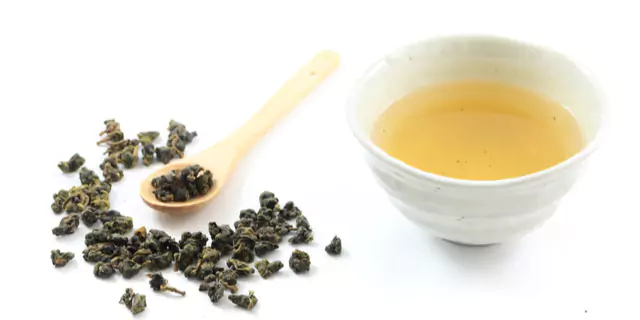
Another type of true tea is oolong, a pretty popular tea made from the same tea plant as black, green, and white tea. The difference is in the process that goes into making oolong tea. Here, the leaves are wilted in the sun, then partially oxidized. It’s a sort of middle ground between green and black tea and as popular as green tea with fruit and herb infusions (fruits infusions like peach oolong and pomegranate oolong are some popular types).
The Research: Like with other types of true tea, the L-theanine in oolong tea can help with things like stress, anxiety, and brain activity. And it may also help prevent and manage diabetes in some people. There are also links with an improvement in blood sugar and some interesting connections with weight loss.
White Tea
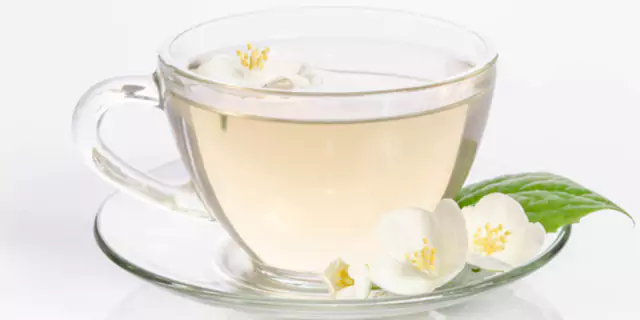
Perhaps the least popular type, this is also the least processed type of tea. The leaves and buds are picked before they’re fully open, giving white tea the mildest, most delicate flavor. It also may be more expensive than other types of tea and sometimes seen as the tea that’s packed with the most benefits.
The Research: White tea contains the most antioxidants because it’s the least processed type of tea. It’s often brought up as a potential beverage to help prevent cardiovascular disease, aid weight loss, and give you healthier skin. But is any of this true? We know that it can have potential anti-inflammatory properties, help with cholesterol, and prevent heart disease in some. And, what about insulin resistance? Some studies show that the polyphenol flavonoids in white tea may help lower your risk of insulin resistance by reducing glucose concentrations. And while research is still ongoing for this one, some animal studies suggest there may be a link with conditions like osteoporosis too.
Rooibos Tea
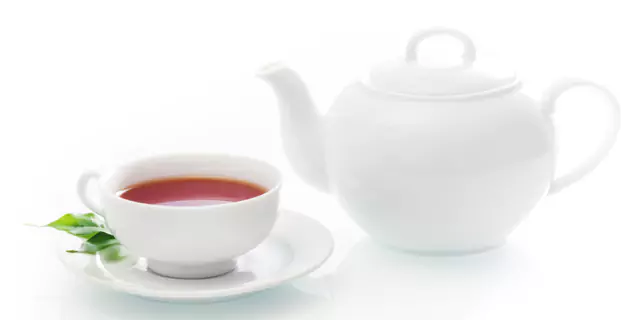
A type of herbal tea or tisane, rooibos, is made from the fermented leaves of a South African shrub. It’s usually caffeine-free unless it’s part of an infusion with black, green, or white tea. Some studies show that if you’re taking diabetes medication, it may slow down the liver enzymes that metabolize drugs like metformin. Still, it’s always best to consult with a healthcare professional here. If you’re sensitive to caffeine and want an alternative with lower tannin levels, this may be a good option for you to try out.
The Research: In some animal models and cell lines, it’s shown to have a potential protective effect against developing type 2 diabetes. The active compound in rooibos is aspalathin (ASP), which has shown some potential to have anti-diabetic properties. Although research is still ongoing, the antioxidants in rooibos tea may help with everything from heart disease to cell protection. While animal studies show some links to diabetes prevention, there’s not yet enough research there.
Hibiscus Tea

Have you ever tried hibiscus tea? Made with the tropical hibiscus plant, this is a tart tea that’s something of an acquired flavor even for the most dedicated tea drinkers. It’s an infusion that you’ll find served hot and cold, sometimes with added sugar to cut out the tart taste (although if you like cranberries, you may not need the sugar!). It’s thought to have the highest level of antioxidants compared to any other type of tea. Like any herbal tea, remember not to over-consume it in a bid to make the most of any benefits it may have for some people.
The Research: Some studies show that it may help lower blood pressure, while others show links with weight loss. Some research also indicates that it may moderate insulin resistance in some models of induced metabolic syndrome. Of course, we need to take animal studies with a grain of salt, but it’s interesting enough to keep an eye on.
Chamomile Tea
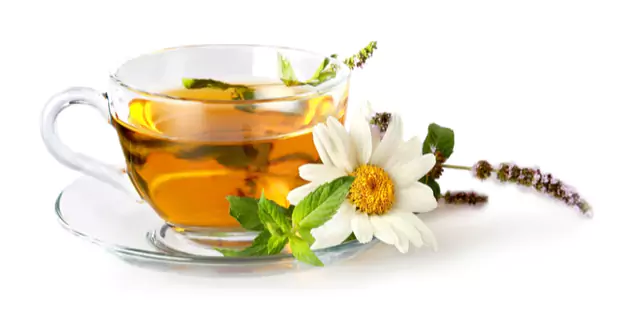
Love drinking a cup of chamomile tea right before bed? If you know anything about chamomile tea already, it’s because of its increasing popularity as a good bedtime beverage. Made with dried chamomile flowers, this caffeine-free tea is usually safe to consume if you’re not allergic to the flower. If you’re pregnant, you may want to check with your doctor to avoid any complications.
The Research: Chamomile is in everything from skincare products to beverages, but research on its benefits is still ongoing. Still, it can help some people with anxiety and produce relaxing effects that help promote good sleep. Some research suggests improved antioxidant levels and glycemic indices, which means it’s a tea to watch as the research continues.
While these are some types of tea to think about, there are so many more. Ginger tea, for example, may be one to watch. This is because ginger can have beneficial effects like glycemic control for people with diabetes and helping with nausea. Peppermint tea may lower stress levels and help with high blood pressure, and cinnamon tea could help lower blood sugar levels. Turmeric tea, full of the many benefits of curcumin, could also improve insulin sensitivity. Curcumin is the primary bioactive compound in turmeric, and it requires black pepper to be absorbed efficiently.
None of this means that tea is a magic drug that can solve all your health problems. Still, it’s interesting enough to warrant some experimentation. So, what type of tea is best for you? Test out some different varieties and see for yourself!
Find the right Nutrisense programto turn insight into progress.
Go Beyond Glucose Data with Nutrisense
Your glucose can significantly impact how your body feels and functions. That’s why stable levels are an important factor in supporting overall wellbeing. But viewing glucose isn't enough. Nutrisense, you’ll be able to learn how to use your body's data to make informed lifestyle choices that support healthy living.
One-to-one coaching
Sign up to access insurance-covered video calls to work with a glucose expert: a personal registered dietitian or certified nutritionist who will help tailor your lifestyle and diet to your goals.
Monitor and measure what matters
With the Nutrisense CGM Program, you can monitor your glucose with health tech like glucose biosensors and continuous glucose monitor (CGM)s, and analyze the trends over time with the Nutrisense App. This will help you make the most informed choices about the foods you consume and their impact on your health.
Find your best fit
Ready to take the first step? Start with our quiz to find the right Nutrisense program to help you take control.

Kara Collier is a registered dietitian nutritionist and certified nutrition support clinician who is passionate about reshaping how we approach prevention, behavior change, and metabolic health. A Forbes 30 Under 30 honoree, she’s helped over 150,000 people improve their metabolic health using tools like continuous glucose monitors and behavior-focused nutrition strategies. Kara has been featured by Forbes, UC Berkeley, and HLTH, and has appeared on top podcasts like Mind Pump and The Genius Life.




